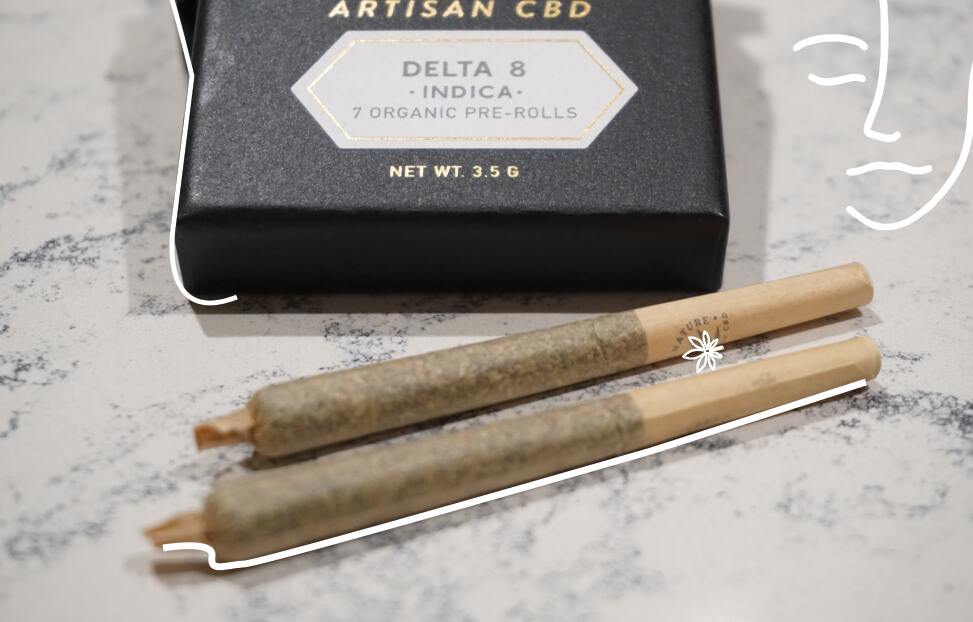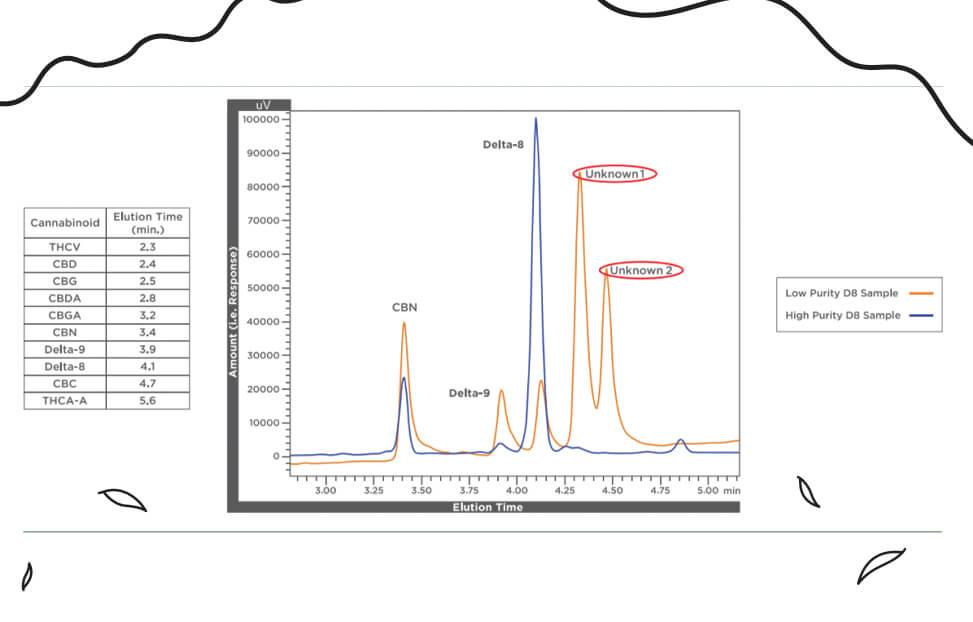There is a new buzz word in the hemp CBD world that is not only confusing the consumer, but could significantly damage the hemp industry and the progression in its understanding and future cultural acceptance. Delta 8 is a deceptively labeled hemp cannabinoid and as you read the following you will see that with Delta 8 the devil truly is in the details!

Photo by Elsa Olofsson on Unsplash
What is Delta 8?
Delta 8 is a minor cannabinoid that does naturally occur in the hemp plant, but it does so in such minute qualities it is not usually detectable on a lab test. Molecularly it is almost the same as Delta 9, a cannabinoid found with more frequency in hemp extractions, but the double bond is between the 8-9 carbons rather than the 9-10 carbons.

Naturally occurring Delta 8 VS Delta 8 products?
When the 2018 farm bill came about everyone wanted to start growing hemp. But with the financial burdens of this past year combined with changing laws, some hemp farmers found themselves with more crops than they knew what to do with. And this is where we get our Delta 8 phenomena. Companies are currently able to buy large amounts of hemp crops very inexpensively. This is what they are using to produce the Delta 8 products. As Mr. Carter says, “It is all about the mula baby.”
In the World Health Organization’s 2018 review of the isomers of THC they clearly stated, “Since ()-trans-Δ8-THC occurs in cannabis only in traces, it is generally obtained by chemical synthesis.” To isolate CBD from a hemp extract is fairly simple, because it is so abundant in the plant. Extractors just soak the plant in a simple solvent, such as alcohol or ethanol, create an oil, and purify the extract until it is only CBD. To distillate a cannabinoid such as CBG is a similar process, but a bit trickier because one has to find a strain that is high in CBG and harvest at exactly the right time to ensure high CBG results. Now, with a cannabinoid as minor as Delta-8 it takes more chemistry and it is only rendered possible through a synthetic process.
To figure out how exactly these products are produced and what we know about them, we talked to Jason Wilson. He is a biologist that has spent the past decade working in the cannabis industry. He began in the lab and has worked primarily in the analytical labs, therefore he knows the true ins and outs of the quality, microbiology, and chemistry of cannabis products. Additionally, he has done some hemp-cultivation himself. He is a man who truly cares about this plant and the people it helps, he is the author of the Curious About Cannabis book and host of The Curious About Cannabis Podcast. Get educated about the science behind cannabis at: www.curiousaboutcannabis.net
Mr. Wilson explained that what we are talking about is an isomer of Delta 9 THC. An isomer is a chemical that has the same chemical formula as another molecule but is arranged slightly differently. Producers realized that one can take hemp cbd and, through synthetic manipulation, convert it to Delta 8 by exposing cbd to very acidic conditions in order for the molecules to rearrange themselves into delta 9 and eventually delta 8. These “acidic conditions” equate to soaking the CBD in acidic solutions, such as the popular sulfuric acid. Mixing plant oil with harsh chemicals, before human consumption, is not an ideal image for most of us, and we must ask ourselves is this in the spirit of holistic, natural healing?
After one has taken the hemp extract, mixed it with one’s acid of choice, and then, depending on the quality of the chemist doing the mixing, the extract roominates, and the chemical change happens, and the chemical solution is, then, continually purified and tested in-house until the levels of Delta 8 THC are higher than Delta 9 THC. Now you have a synthetic delta-8 THC distillate. One should wonder “Why are people claiming this is a naturally occurring cannabinoid like all the rest?”
By using these acids and synthetically changing the molecular structures, many unknown variables are introduced into this picture, and this is putting the consumer in danger. With Delta 8 products, which are synthetically created distillates (as opposed to the minuscule amounts of organically occurring delta 8 in cannabis), nature did not create a cannabinoid, the acid did.

Photo by USGS on Unsplash
What are the dangers to one’s health?
There is one main issue here: the lab tests. When testing a hemp extraction you will see peaks with the different cannabinoids such as in the test below. The tall line is a peak, it shows that there are high levels of Delta-8 in this extraction. In the reports for these Delta-8 products, not only are there chemicals such as acetone popping up, but there are mystery peaks as exemplified below.

In extractions there can be minor impurities, but with the Delta 8 products these peaks show us that there are huge amounts of mysterious substances being created and the scientists simply do not know what they are. It is speculated that they could be other isomers of thc, but we just don’t know and therefore we have these unknown variables. The “unknowns” need to be identified as they are significant in the lab tests and we have no knowledge about their implications or risks in terms of human consumption.
Havok in ending the stigma around hemp.
I almost forgot – Delta 8 THC gets you high! Hemp already has a ridiculous amount of stigma attached to it due to the confusion between hemp and its cousin plant marijuiana. Sadly, those who would benefit the most from hemp have the most amount of societal programming around it’s taboo nature. While the abundant phytocannabinoids from the marijuana plant are able to help with nausea and more malignant health problems, phytocannabinoids from the hemp plant are all about the immune system. The immune system is what regulates stressors of the body, this includes physical stressors, such as in joint pain, and mental ones, such as with anxiety. Yet many are unwilling to take hemp-derived cannabinoids, such as CBD, because they think it will get them high! When this is simply not true! But if the cannabinoids are being manipulated on a molecular level, it changes the whole dynamic and perception of the hemp industry. This is exactly what is happening with delta 8. CBD is being synthetically manipulated to create a psychoactive cannabinoid.
Think about if your grandma with dementia picked up a delta-8 product thinking it was hemp-derived as it was sold to her without any measures to let her know this was a psychoactive product? Well, as someone with a family history of dementia, this would be very sad to see and who knows if it could potentially make a struggling mind worse. Naturally occurring hemp CBD, on the other hand, would not harm one’s mental functions or ability to concentrate. It might even be helpful with retaining mental clarity! Therein lies the true danger of the proliferation of Delta 8 products being sold as hemp derived for the hemp CBD industry. It basically goes against everything that differentiates hemp from marijuana in the psychoactive effects.
The Hemp Authority Round Table put it best,
“The U.S. Hemp Roundtable has taken a strong stance on this issue. We are opposed to marketing products under the guise of hemp for their intoxicating effect. While we are not calling for a strict Delta-8 ban, we believe that intoxicating products should be regulated akin to adult-use cannabis, sold in dispensary-like settings away from minors. The dietary supplement and food/beverage additive lanes should be limited to non-intoxicating hemp products.”
Let me be clear, we love our marijuana people, THC has many wonderful medicinal benefits, but let’s keep the worlds separate! In my personal opinion, the naturally occurring THC from the marijuana plants has been researched to be both extremely safe and medicinal – we should trust the Earth! Why isolate a synthetically made form of THC that we don’t know much about instead of getting the real thing?

Photo by Yoann Boyer on Unsplash
What are we risking with Delta-8? Keeping hemp out of the hands of the pharmaceutical industry.
Big pharma is waiting to get their hands on CBD. In fact, they have had a patent on the chemical makeup of cannabidiol (CBD) since the 1950s! When it was illegal – yes! The government has always known of the medicinals properties of the hemp plant. If you want to read on cannabis’s political history in the United States check out: Fear, Propaganda, and the American Psyche.
If something does happen, whether it is because of these peaks or because a teenager or elderly person gets high and has a motor vehicle accident, this could give the government an excuse to come in and over-regulate the industry. We do need more FDA regulations actually, because right now there enforcement is ambiguous/nonexistent and people are producing bogus products, but for the government to come in and give this plant to big pharma would be such a tragedy. When asked about how delta-8 could affect the hemp industry, Mr. Wilson said, “It’d be great to see the industry regulate itself and show a clear commitment to quality and consumer safety before the government decides it has to.. I do worry that the current delta-8 issue could set the hemp industry back and put a black eye on the emerging Cannabis industry as a whole – hemp, medical, and adult-use included.”
What are the current laws on Delta 8?
The DEA has stated, synthetic cannabinoids are under the schedule 1 category of illegal drugs. A couple of shops selling Delta 8 have been busted by the local authorities and had their products confiscated. Some states are in the process of enacting laws banning the substance, while others are creating frameworks to ensure those buying are 21+ and that it is not being shipped out of state.
In Conclusion
The marketing around delta 8 is just that: marketing. There are misleading claims that it’s “hemp derived”or “a distillate.” While these claims are technically true, there is a huge part of this picture missing: this is a synthetically created cannabinoid. It is synthetically derived from hemp, and the synthetic process requires soaking isolated CBD in acidic solutions to create a synthetic change in the molecular structure of the cannabinoids, which is something never mentioned by the companies selling these products. There are serious issues to be confronted here such as the safety around the extractions, the unknown variables in the lab reports, and the lack of research. With true hemp cannabinoid distillates, cannabinoids are simply extracted out of oil, whereas with delta 8 cannabinoids are purified after soaking isolated CBD in acids to change its molecular structure, therefore synthetically manipulating the chemical makeup.
Not only are these delta-8 products of unknown quality, possibly containing chemical byproducts of unknown safety profiles, but people don’t know, as it is not at all clearly communicated, that they will get you high! At Botanicam we are all about the hemp plant as medicinal. What seems to be happening with Delta 8 is a loophole to sell a product that can legally get people high without a concern for the risks to one’s health or the hemp industry.
We don’t have any problems with getting high over here, but we do have a problem with putting the hemp industry in danger. We are just getting to the point where hemp is going to be accepted by the public as a whole. This could bring true healing to a nation addicted to prescription pills and in much physical and mental stress daily. That is why we do not support Delta 8 and we will be ending relationships with any companies who do. Maybe later, after it has been properly researched and the mystery variables have been sorted out, Delta 8 can be sold in dispensaries with the other psychoactive cannabinoids. Until all the safety protocols are in place, we are not willing to risk hemp for a synthetically created cannabinoid. As we like to say “Don’t mess with Mother Nature”.
Reference:
I would once again like to thank Jason Wilson for all of his education on delta 8, but beyond that cannabinoids in general – he has the best education on the specific cannabinoids such as CBG, CBN, AND THCV, plus so much more cannabis science! I encourage all readers to check out his book: Curious About Cannabis, his podcast: The Curious About Cannabis Podcast, and his website:
www.curiousaboutcannabis.net. When we are talking about cannabis education – this is a man of science and he is the real deal.

Photo by James Wheeler on Unsplash

An Article By Evie Louise
Evie Louise is a recent psychology graduate from New York University. She is a certified in International Cannabinoid Clinical Therapy. Evie sees all forms of the cannabis sativa plant as the future of psychiatry, and hopes to use it in her therapy practice as a full spectrum approach to mental health and wellness.
